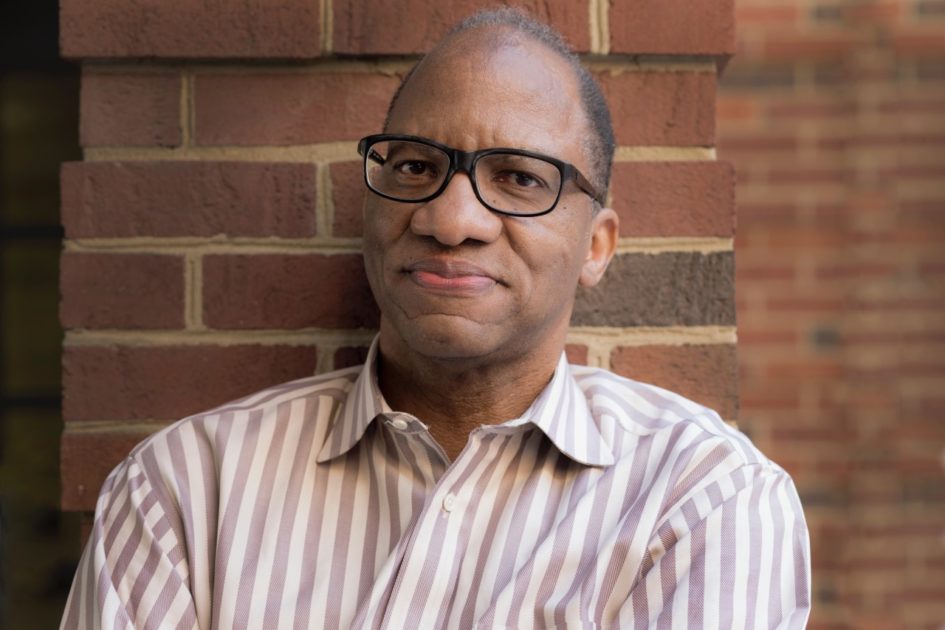Accomplished writer Wil Haygood spoke on campus Tuesday, Sept. 15 about his life as a writer, his published books, and growing up in Columbus.

What inspired you to pursue a career in journalism?
I tended to get good grades in literature and writing, so that seemed to be something that was full of joy. There never was a car in my family, so I would read short stories and novels, and the characters in those short stories and novels often lived in far foreign places, and so by reading about people who lived in far away lands, I started to feel the impact of writing and literature and what it could do as far as transporting someone elsewhere.
What’s one of the biggest lessons you’ve learned in your career?
To come up with my own story ideas. I’ve often come up with my own story ideas on newspapers and I’ve come up with all of my own ideas when it has come to choosing a subject to write about in book form. So, I think I’ve learned to trust my literary gut, and that has served me well.
What’s the transition like, going from more professional writing to more creative writing?
I think that my work as a journalist has fed my appetite for writing books, and then my eagerness to write books has so often benefitted from my work as a newspaper reporter. So, I think in very important ways, one craft has fed the other. When you write books, of course, you interview more people than you would for a normal news story, and so it was a large leap to go from writing 50-,60-,70-inch long-form newspaper feature articles or foreign correspondents. When you choose the subject that you really want to do in book form, and you know going in that it’s going to take you three or four or five years to complete that book, then in my case, because of my newspaper background, I knew that there was a time when I would get to the end of the book, just like you would get to the end of a newspaper story. And so even if it was a short-term assignment on a newspaper or a long-term assignment on a book, I would always set it up where I could see the end of the tunnel.
Who are your biggest inspirations?
I think it’s been reading other writers who I admire. I think it’s been having the goal that I wanted to leap from writing newspaper stories to writing books. I think that I’ve been inspired by feeling that the nation could benefit by me telling stories that hadn’t been told before. Most of my books have been about folks that haven’t been written about. There were not a lot of books about Stanley Davis Jr., or about Sugar Ray Robinson, and there was no book about the White House butler who I wrote about. So, if I can go into this territory that’s sort of wide open for a writer, that just makes me feel good.
What makes journalism and writing and everything that you’ve done important?
It’s history. It’s history in so many cases. It’s history as we are living it. I think in this country we have a tendency to not look honestly into our past. I think that that has harmed this country, and we have a large gap in this country when it comes to racial understanding. Far too many people don’t understand the long tentacles of slavery in this country, and that’s unfortunate. That’s sad. Students need to know why it’s so painful to so many people to have southern monuments of these creatures who have terrorized people during the Civil War and after still standing on these campuses. And when we don’t talk about that, it hurts this whole country.
What’s the most rewarding thing you’ve experienced from your work?
A true unforgettable experience was watching Nelson Mandela walk out of prison in South Africa. He had been locked up for 27 years and there were many people who thought that that day would never come. I was a newspaper reporter — I was a foreign correspondent — and I was in South Africa. To witness that moment was extraordinarily thrilling.
Also to see this nation elect its first African American president was very huge. It shows that there is a muscle in this country to do good. We live in a nation where many figures — Martin Luther King Jr., Medgar Evers — have been murdered, because they were trying to fight for the whole country and for freedom. And they were murdered, and that is a tragic mark on the psyche of this nation.
What advice do you have for student writers, both professional and creative?
Follow your heartbeat when you’re going after a story … when a writer can think of a story and then bring it to the editor and then that editor and writer meet on the same page, that’s a wonderful thing. I wanted in 2008 to go out and find an African American who had worked in the White House … I did not know that I would find [Eugene] Allen, who had worked for eight presidents from Harry Truman to Ronald Reagan … And that was from just looking and old-fashioned shoe leather, knocking on doors, and making phone calls. That’s what writers have to do, I think that it’s important in this country to do that and to keep doing that because we have to beat back this crazy thing of fake news. There’s a lot of real news out here that needs to be recorded and written about.
This interview has been edited for length and clarity.


